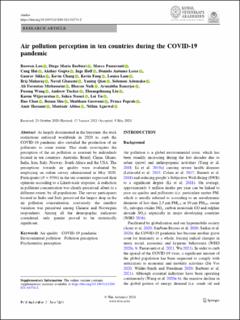Air pollution perception in ten countries during the COVID-19 pandemic
Lou, Baowen; Barbieri, Diego Maria; Passavanti, Marco; Hui, Cang; Gupta, Akshay; Hoff, Inge; Lessa, Daniela Antunes; Sikka, Gaurav; Chang, Kevin; Fang, Kevin; Lam, Louisa; Maharaj, Brij; Ghasemi, Navid; Qiao, Yaning; Adomako, Solomon; Foroutan Mirhosseini, Seyed Ali; Naik, Bhaven; Banerjee, Arunabha; Wang, Fusong; Tucker, Andrew; Liu, Zhuangzhuang; Wijayaratna, Kasun; Naseri, Sahra; Chen, Hao; Yu, Lei; Shu, Benan; Goswami, Shubham; Peprah, Prince; Hessami, Amir; Abbas, Montasir; Agarwal, Nithin
Peer reviewed, Journal article
Published version

Åpne
Permanent lenke
https://hdl.handle.net/11250/2772746Utgivelsesdato
2021Metadata
Vis full innførselSamlinger
Sammendrag
As largely documented in the literature, the stark restrictions enforced worldwide in 2020 to curb the COVID-19 pandemic also curtailed the production of air pollutants to some extent. This study investigates the perception of the air pollution as assessed by individuals located in ten countries: Australia, Brazil, China, Ghana, India, Iran, Italy, Norway, South Africa and the USA. The perceptions towards air quality were evaluated by employing an online survey administered in May 2020. Participants (N = 9394) in the ten countries expressed their opinions according to a Likert-scale response. A reduction in pollutant concentration was clearly perceived, albeit to a different extent, by all populations. The survey participants located in India and Italy perceived the largest drop in the air pollution concentration; conversely, the smallest variation was perceived among Chinese and Norwegian respondents. Among all the demographic indicators considered, only gender proved to be statistically significant.
